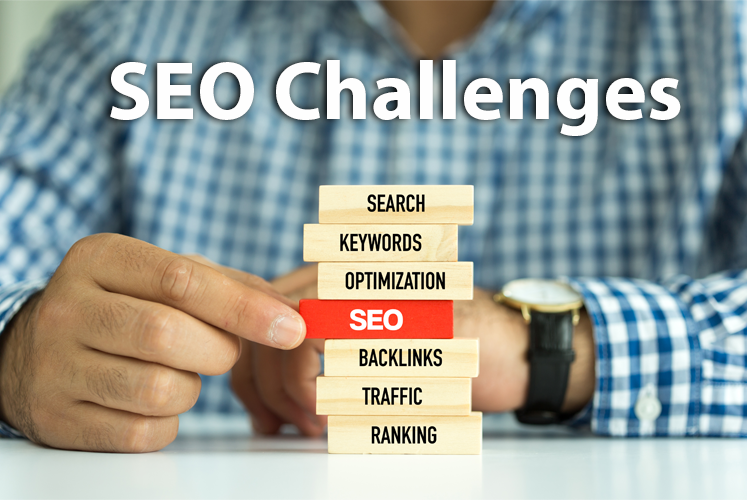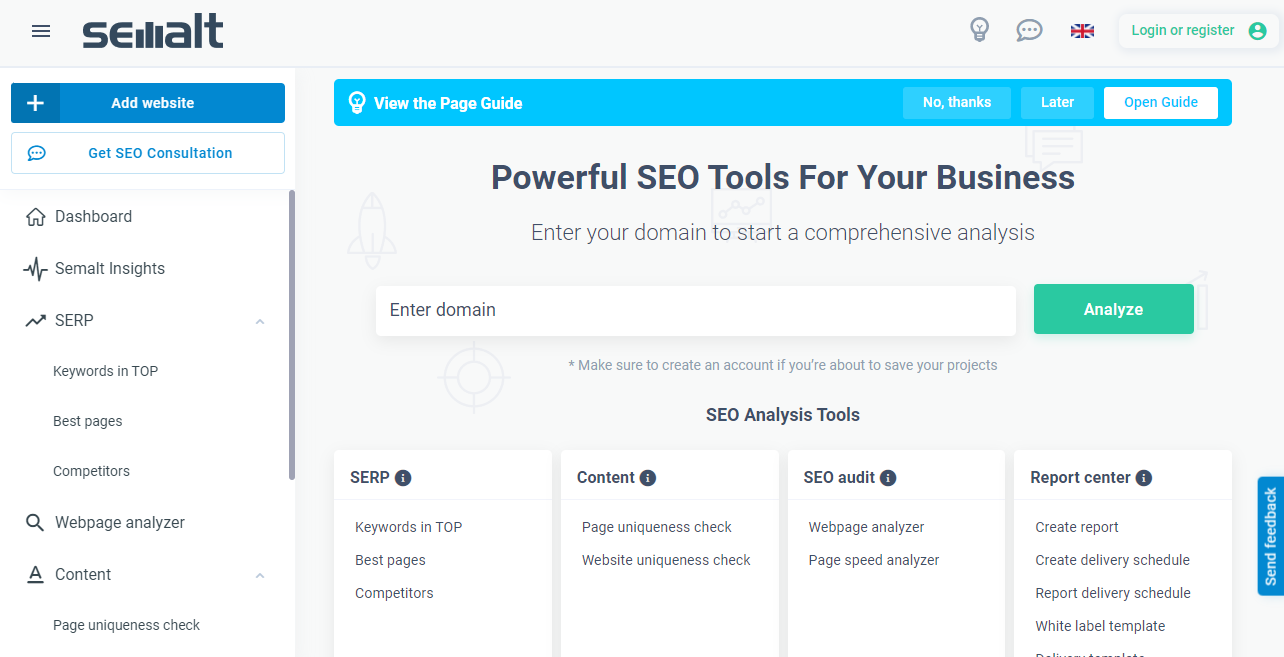The SEO Challenges For Strong Brands - Semalt Tips

Having a strong brand is crucial for any business, as it helps to establish trust and credibility with customers. However, when it comes to search engine optimization (SEO), strong brands often face unique challenges. These challenges can range from managing a high volume of content to dealing with negative online reviews.
In this blog post, we will explore the specific SEO challenges that strong brands face and discuss strategies for overcoming them. Whether you're a large corporation or a small business with a strong reputation, this article will provide valuable insights and actionable tips for improving your online visibility and driving more traffic to your website.
Maintaining a consistent brand image across all online platforms
Maintaining a consistent brand image across all online platforms is crucial for strong brands to ensure that their target audience recognizes and trusts their brand. However, this can be a significant SEO challenge as different platforms have different algorithms and formats. For example, social media platforms such as Instagram and Facebook prioritize visual content while search engines like Google prioritize text-based content.
To overcome this challenge, brands must have a clear and consistent brand voice and visual identity. This includes using similar language, tone, and imagery across all platforms. Additionally, brands must ensure that their website and social media profiles are consistently updated with fresh and relevant content. This will help to keep their audience engaged and increase their visibility on search engines.
Another important aspect to consider is the use of keywords and meta tags. Brands must ensure that their website and social media profiles are optimized for relevant keywords to increase their visibility on search engines. Additionally, they must use meta tags and descriptions to provide a clear and concise summary of their brand and what they offer.
Overall, maintaining a consistent brand image across all online platforms is essential for strong brands to establish trust and credibility with their target audience. By having a clear and consistent brand voice, updating their profiles with fresh and relevant content, and optimizing their website and social media profiles for relevant keywords, brands can overcome SEO challenges and increase their visibility on search engines.
Keeping up with constantly changing SEO algorithms

One of the biggest SEO challenges for strong brands is keeping up with constantly changing SEO algorithms. With search engines like Google constantly updating and refining their algorithms, it can be difficult for brands to stay on top of the latest SEO trends and best practices.
One way for strong brands to stay ahead of the curve is to stay informed about the latest algorithm updates and changes. This can be done by subscribing to industry newsletters, attending SEO conferences and webinars, and following industry leaders on social media.
Another strategy for strong brands is to focus on creating high-quality content that is relevant, informative, and engaging. This can include a mix of blog posts, videos, infographics, and other types of content that are designed to attract and retain visitors.
In addition, strong brands can also focus on building strong backlinks to their websites. This can be done by reaching out to other websites and asking them to link back to your site, or by creating valuable content that others will naturally want to link to.
Managing negative online reputation and reviews
Strong brands often have a large online presence and a significant following, which can make managing their reputation a challenging task. One of the biggest SEO challenges that strong brands face is managing negative online reputation and reviews. With the rise of social media and review sites, it's easier than ever for customers to voice their dissatisfaction and share their negative experiences with a brand.
Negative reviews and comments can have a detrimental effect on a brand's reputation and SEO, as they can lower the brand's overall rating and decrease its visibility in search engine results. This can be especially damaging for strong brands that have built a reputation for providing high-quality products and services.
To manage negative online reputation and reviews, strong brands need to be proactive and take a multi-faceted approach. This includes monitoring their online presence, engaging with customers, and addressing any negative feedback in a timely and professional manner.
One of the most important things that such brands can do is to actively monitor their online presence and track customer reviews and comments. This allows them to quickly identify any negative feedback and address it before it has a chance to spread and cause more damage.
Another important strategy is to engage with customers and address their concerns. This can be done through social media, email, or phone. By responding to customer complaints and addressing their concerns, strong brands can show that they care about their customers and are committed to providing the best possible service.
Finally, strong brands need to be transparent and honest about their products and services. This means being upfront about any issues or problems that may arise and working to quickly resolve them. By being honest and transparent, strong brands can build trust and credibility with their customers, which can help to mitigate the negative effects of negative reviews and comments.
Balancing keyword optimization and creating high-quality content

One of the main SEO challenges for strong brands is balancing the need for keyword optimization with the creation of high-quality content. Keyword optimization is important for ensuring that a brand's website appears in search engine results for relevant keywords, but it can also lead to the creation of low-quality, keyword-stuffed content that does not provide value to the user.
On the other hand, creating high-quality content that is informative, engaging, and relevant to the target audience is essential for building trust and authority with both search engines and users. However, this type of content may not always be optimized for specific keywords, making it difficult for the brand to appear in search results.
To overcome this challenge, strong brands need to strike a balance between keyword optimization and creating high-quality content. This can be achieved by researching and targeting a specific set of keywords that are relevant to the brand's products or services and then creating content that is optimized for those keywords while still providing value to the user.
Additionally, strong brands should focus on creating a variety of content types, such as blog posts, infographics, videos, and more, to appeal to different audiences and improve their chances of appearing in search results. By balancing keyword optimization and creating high-quality content, strong brands can improve their SEO efforts and drive more traffic to their website.
Staying ahead of the competition in search engine rankings
Staying ahead of the competition in search engine rankings is one of the biggest SEO challenges for strong brands. With so many businesses vying for the top spots in search engine results pages (SERPs), it can be difficult for established brands to maintain their position. This is especially true in highly competitive industries where there are a large number of competitors vying for the same keywords and phrases.
One way to stay ahead of the competition is to continually update and optimize your website. This includes ensuring that your website is mobile-friendly, fast-loading, and easy to navigate. Additionally, you should focus on creating high-quality content that is relevant to your target audience. This will help you build authority and credibility in your industry, which will in turn help you to rank higher in search engine results.
Another important aspect of staying ahead of the competition is to stay on top of the latest SEO trends and best practices. This includes staying up-to-date with the latest algorithm updates from search engines like Google and Bing, as well as staying informed about the latest trends in link building, keyword research, and other important SEO strategies. With the help of The Dedicated SEO Dashboard, you can analyse your competitors' websites and find out what they are doing well and what they are doing wrong to improve your own SEO strategy. And also, The Dedicated SEO Dashboard can help you to monitor your competitors' ranking and track their backlinks to find new opportunities for your own website.

Adapting to the shift towards voice search optimization
Voice search optimization has become a critical aspect of SEO for strong brands. With the rise of virtual assistants like Siri and Alexa, more and more people are turning to voice search to find what they need online. This shift in search behaviour has led to a change in the way brands need to approach their SEO strategy.
One of the biggest challenges for strong brands when it comes to adapting to voice search optimization is understanding the different keywords and phrases that users are searching for. Unlike traditional text-based search, voice search queries tend to be more conversational and natural-sounding. This means that brands need to focus on long-tail keywords and phrases that are more likely to be used in voice search queries.
Another challenge for strong brands is creating content that is optimized for voice search. This includes using schema markup and structured data to make it easier for search engines to understand the content on a website. It also means creating content that is easy to read and understand, with a clear hierarchy and a focus on answering the user's question or providing the information they need.
Strong brands need to be aware of the different devices and platforms that users are using for voice searches. This includes not only smart speakers but also mobile devices and virtual assistants like Google Assistant and Bixby. Brands need to ensure that their website and content are optimized for each platform and device to provide the best possible user experience.
Maximizing the potential of local SEO for strong brands with multiple locations

Strong brands with multiple locations can face unique SEO challenges when it comes to optimizing their presence in local search results. Local SEO, or the process of optimizing a brand's online presence for specific geographic locations, can be a powerful tool for these brands to drive foot traffic and increase visibility in their target markets. However, without the proper strategies in place, local SEO can be difficult to navigate and may not yield the desired results.
One of the biggest challenges for strong brands with multiple locations is ensuring that each location is accurately represented in local search results. This includes making sure that each location's name, address, and phone number (NAP) is consistent across all online listings, as well as ensuring that each location has its own unique web page with relevant content and optimized meta tags. Additionally, it is important to claim and verify each location's Google My Business listing, as well as other local directories, to ensure that they are accurately represented in local search results.
Another challenge for strong brands with multiple locations is creating and maintaining a consistent brand message across all locations. This includes ensuring that each location's website and social media accounts are consistent with the brand's overall tone and messaging, as well as making sure that each location is properly represented in all online listings and directories.
To maximize the potential of local SEO for strong brands with multiple locations, it is important to develop a comprehensive strategy that addresses these challenges head-on. This includes regularly monitoring and updating each location's NAP and online listings, as well as creating a consistent brand message across all locations. Additionally, brands should consider investing in local link-building and citation-building efforts to increase visibility and authority in local search results.
Conclusion
Strong brands face unique SEO challenges that can be difficult to overcome. These challenges include maintaining their brand reputation and trust, competing with other established brands in their industry, and staying relevant in a constantly changing digital landscape. However, with the right strategies and techniques, strong brands can effectively navigate these challenges and continue to drive traffic and conversions through their website. By staying informed about the latest SEO trends and best practices, and investing in a solid SEO strategy, strong brands can successfully meet the demands of today's digital world and continue to dominate their industry.